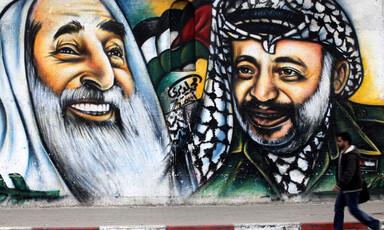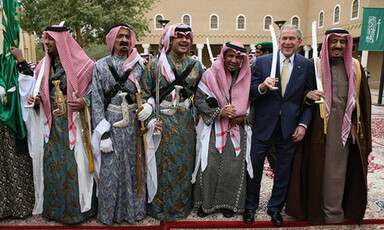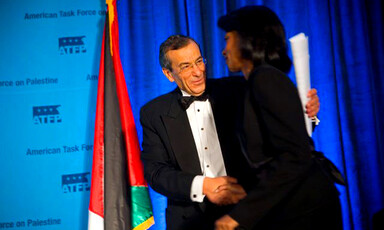
The PLO has failed Palestinians; let's start again from scratch
21 March 2013
We won’t achieve democracy with a movement that’s not democratic. Read more about The PLO has failed Palestinians; let's start again from scratch

21 March 2013
We won’t achieve democracy with a movement that’s not democratic. Read more about The PLO has failed Palestinians; let's start again from scratch

13 January 2011
Although As’ad Ghanem’s new book Palestinian Politics after Arafat: A Failed National Movement focuses on the post-Arafat era, the dead leader permeates the pages and his legacy hangs like a specter over the Palestinian body politic. Read more about Book review: Arafat's ghost and the Palestinian national movement

21 December 2010
This month marked a low point in the Obama administration’s attempts to resolve the Palestinian-Israeli conflict. Instead of emphasizing direct talks between the parties, Washington will now attempt to mediate between them to develop a framework agreement around the core issues. Sound familiar? It should. The Obama administration is following the same failed path of its three predecessors to achieve peace. Osamah Khalil comments. Read more about The death of the peace process

16 November 2010
The conventional wisdom is that when Washington has exerted pressure on Israeli governments they have eventually succumbed to American demands. However, a closer reading of the historical record and declassified American archival documents reveals a more complex dynamic between the two allies. Read more about The myth of American pressure

7 October 2009
Whether or not the clumsy attempt to shelve the Goldstone report on last winter’s Gaza attacks is the tipping point for Mahmoud Abbas’s rule, the succession process has been underway for several years. However, it is being coordinated by the US and Israel and is no reflection of the wishes and desires of the Palestinian people. Abbas’s likely successor is Salam Fayyad, who somehow manages to be an even more uninspiring and unpopular character. Osamah Khalil comments for The Electronic Intifada. Read more about A poverty of leadership

29 December 2008
As a consequence of his foreign policy misadventures, Bush leaves the Middle East in flames and America’s reputation in tatters. Yet, one thing has remained constant for the aloof president: deference to an Israeli “show of strength” rather than diplomacy. Only a year ago, Bush hosted the Annapolis conference that “relaunched” the “peace process” and then predictably stood by as it stalled out. Unable to launch a war against Iran, capture Osama bin Laden, pacify Afghanistan or Iraq, or broker a Palestinian-Israeli peace, rather than ride into the sunset in the waning days of his presidency, Bush is determined to leave in a final blaze of malicious incompetence. As it has been so often over the past eight years, the site of his enmity is Gaza. Osamah Khalil comments for The Electronic Intifada. Read more about The dogs of war

29 January 2008
The past few days have demonstrated that there is more to the destruction of the Rafah wall than the simple Hamas-Fatah dichotomy or the endless inane commentary of its impact on the “peace process.” Hamas could destroy the wall, but unless Palestinians were willing to cross the borderline and face the threat of Egyptian security forces it would have been a futile gesture. That Palestinians went over that line again and again illustrates the powerful urge for freedom from oppression and occupation. Osamah Khalil comments from Cairo. Read more about A break in the siege

23 January 2008
A staggering disparity in images has emanated from the Middle East over the past two weeks. While US President George W. Bush received a warm welcome during his tour of the Persian Gulf, Israel pounded Gaza killing over 40 Palestinians, nearly half of them civilians. Bush participated in sword dancing ceremonies, watched the prowess of hunting falcons, and in the United Arab Emirates he was finally greeted with the flowers that he once believed American troops would receive in Iraq. Osamah Khalil comments. Read more about Sword dancing while Gaza starves

29 November 2007
So it is over. The much heralded Annapolis “meeting” attended by over 50 countries and organizations has ended, and the result is a vague, non-binding agreement to begin negotiating. In typical fashion, the Bush administration has hailed the conference of low-expectations and even less tangible results as a “success.” Instead of donning a flight suit and landing on an aircraft carrier, US President George W. Bush offered his best Bill Clinton imitation presiding over a ceremonial handshake between Israeli Prime Minister Ehud Olmert and Palestinian President Mahmoud Abbas, like an approving father or Roman emperor. Osamah Khalil comments for EI. Read more about Mission accomplished

8 October 2007
Palestinian Authority President Mahmoud Abbas and his lackeys are offering Palestinians a simple and false choice: either you are with “us” (i.e., the PA and Fatah) or you are with the “terrorists” (i.e., Hamas and Iran). In the United States, Abbas has been aided in this effort by the American Task Force on Palestine (ATFP), a fledgling organization that professes to represent Palestinian-American interests. EI contributor Osamah Khalil finds the implications of these tactics on Palestinian advocacy and aspirations in the current political climate bear further scrutiny, as do the organizations and individuals which employ them. Read more about Politics of fear